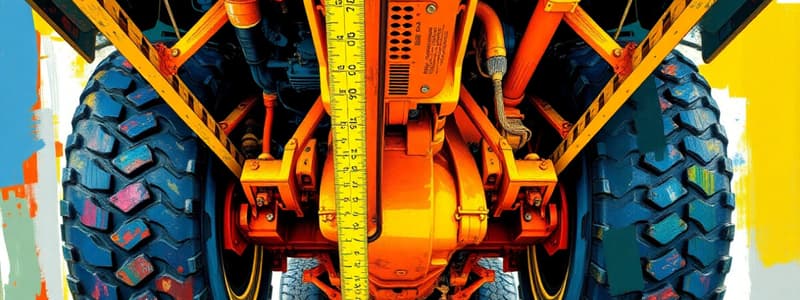Podcast
Questions and Answers
Nicolette van Vreden is the originator of the document.
Nicolette van Vreden is the originator of the document.
True (A)
The document was approved on 1 June 2024.
The document was approved on 1 June 2024.
False (B)
The procedure outlined is focused on measuring undercarriage wear.
The procedure outlined is focused on measuring undercarriage wear.
True (A)
The SHEQ Department had no involvement in the acceptance for implementation.
The SHEQ Department had no involvement in the acceptance for implementation.
Nico Marx is the originator of the document.
Nico Marx is the originator of the document.
The primary objective of the procedure is to measure the wear and tear of undercarriage components in heavy machinery.
The primary objective of the procedure is to measure the wear and tear of undercarriage components in heavy machinery.
Field Service Technicians are responsible for providing training to measuring technicians.
Field Service Technicians are responsible for providing training to measuring technicians.
The procedure emphasizes prioritizing environmental responsibility while measuring undercarriage wear.
The procedure emphasizes prioritizing environmental responsibility while measuring undercarriage wear.
Compliance with customer-specific and industry-standard health and safety regulations is optional during undercarriage wear measurements.
Compliance with customer-specific and industry-standard health and safety regulations is optional during undercarriage wear measurements.
The Health and Safety Officer/Coordinator has a role in ensuring that health and safety regulations are ignored during measurements.
The Health and Safety Officer/Coordinator has a role in ensuring that health and safety regulations are ignored during measurements.
Flashcards are hidden until you start studying
Study Notes
Undercarriage Measurement Procedure
- This Standard Operating Procedure (SOP) outlines the safe and responsible process for measuring undercarriage wear in heavy machinery.
- The objective is to establish clear guidelines for assessing the wear and tear of undercarriage components.
- This procedure ensures compliance with customer-specific and industry-standard health and safety regulations.
Responsibilities
- Field Service Technician: performs undercarriage wear measurements, adheres to all safety regulations, ensures accuracy of measurements, and reports any safety concerns.
- Workshop Manager: provides training and guidance for technicians, ensures they have the necessary tools and resources, oversees compliance with safety regulations, and handles any issues or discrepancies identified during the measurement process.
- Health and Safety Officer/Coordinator: collaborates with the supervisor to ensure compliance with all health and safety regulations during measurement activities.
Procedure
Undercarriage Measuring
- Before beginning, ensure the machinery is in a safe location and the engine is off.
- Conduct visual inspection for any visible damage or loose parts.
- Thoroughly inspect the tracks for cuts or bends.
- Determine if there is enough tension in the tracks.
- Measure the distance (pitch) between 5 box sections, center to center of pins.
- Ensure the track chain is in place and has no signs of disengaging.
- Check pins and bushings for wear and if they need turning.
- Inspect rollers for damage, flat spots, and wetness, which may indicate leakage.
- Sprockets are often a strong indicator of undercarriage health. If they are sharp and show signs of wear, other components may require attention.
- Use calipers to measure the top and bottom rollers.
- Measure pins and bushings with a pin-and-bushing caliper.
- Measure track shoe width with a tape measure and depth with a depth gauge.
- Measure the rail height with a depth gauge.
- Use a smaller depth gauge to measure the idler.
- Use a wear percentage chart to determine the wear of each component.
- Enter all measurements into the undercarriage report book, including customer details.
- Make suggestions or remarks regarding the wear assessment.
Documentation and Filing Procedure:
- After the measurements are complete, document the results in the undercarriage report book.
- Include detailed information such as:
- Machine serial number
- Hours of operation
- Date of measurement
- Customer name
- Specific measurements for each component.
- Provide a clear summary of wear, highlighting any critical components requiring attention.
- Retain a physical copy of the report, ensuring proper storage and accessibility.
Compliance, Review and Continuous Improvement
Periodic Review and Compliance:
- Conduct regular reviews of this SOP to maintain its relevance and effectiveness.
- Seek feedback from technicians involved in undercarriage measurements to continuously improve the procedure.
- Stay informed about changes in safety regulations and industry best practices.
- Update the SOP accordingly to ensure compliance with the latest standards.
Studying That Suits You
Use AI to generate personalized quizzes and flashcards to suit your learning preferences.



